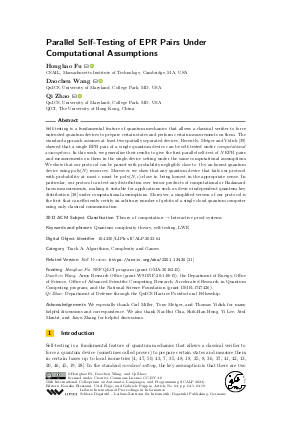@InProceedings{fu_et_al:LIPIcs.ICALP.2023.64,
author = {Fu, Honghao and Wang, Daochen and Zhao, Qi},
title = {{Parallel Self-Testing of EPR Pairs Under Computational Assumptions}},
booktitle = {50th International Colloquium on Automata, Languages, and Programming (ICALP 2023)},
pages = {64:1--64:19},
series = {Leibniz International Proceedings in Informatics (LIPIcs)},
ISBN = {978-3-95977-278-5},
ISSN = {1868-8969},
year = {2023},
volume = {261},
editor = {Etessami, Kousha and Feige, Uriel and Puppis, Gabriele},
publisher = {Schloss Dagstuhl -- Leibniz-Zentrum f{\"u}r Informatik},
address = {Dagstuhl, Germany},
URL = {https://drops.dagstuhl.de/entities/document/10.4230/LIPIcs.ICALP.2023.64},
URN = {urn:nbn:de:0030-drops-181160},
doi = {10.4230/LIPIcs.ICALP.2023.64},
annote = {Keywords: Quantum complexity theory, self-testing, LWE}
}

 Creative Commons Attribution 4.0 International license
Creative Commons Attribution 4.0 International license

